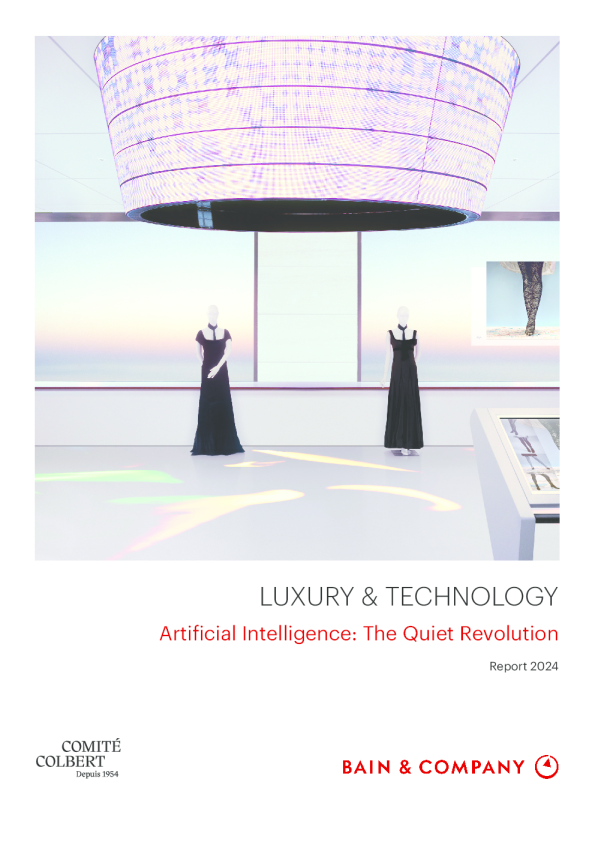静悄悄的革命:人工智能如何正在变革奢侈品行业-2024-47页
 AI智能总结
AI智能总结
人工智能 : 安静的革命 报告 2024 Authors Mathilde Haemmerl é合伙人 , 奢侈品主管 ,贝恩公司法国 Jo è lle de Montgolfier贝恩公司消费品、零售和奢侈品业务执行副总裁 Cyrille Vincey贝恩公司 (Bain & Company) 法国人工智能主管合伙人 Charlotte Bouttier贝恩公司法国零售和奢侈品业务高级经理 作者要感谢Agathe Guerin Quentin Plessis,and Marie de Mitry,法国贝恩公司的顾问 , 感谢他们对本报告的贡献。 科尔伯特委员会团队 B é n é dicte Epinay总裁兼首席执行官 , Comit é Colbert Laurent Dhennequin内阁主任科尔伯特委员会 奢华与技术 - 人工智能 : 安静的革命 目录 第1部分:奢侈品行业的深刻转型之初……第10页第2部分:AI在奢侈品行业中的战略目标……第18页目标1:AI提升运营效率………21目标2:AI服务于客户关系…………25目标3:AI增强团队能力…………29目标4:AI助力创意功能…………32 致谢.第 3 部分 : 赋予人工智能应有的地位 : 价值创造战略的必要性。 38方法论 42 Summary 自五年前分析型人工智能首次应用于奢侈品市场以来,AI解决方案的采用一直保持在较为集中的有限范围内。在我们研究的20个应用场景中,平均只有不到两个场景被Comité Colbert(法国奢侈品行业协会)的成员采纳,而没有任何一个场景被超过30%的奢侈品企业采用。Maisons。分析 AI 支持的用例是由Maisons. 随着众多试点的进行 , 人工智能的采用将在未来 12 - 24 个月内加速 : 每个Maison目前正在测试或规划五个以上的其他用例。 人工智能的采用水平存在显著差异 , 具体取决于人工智能的大小Maison大型企业部署了其他企业的三倍以上的应用场景。然而,随着生成式AI的推广,这一差距应逐渐缩小,因为生成式AI相较于分析型AI更加易获取且成本更低。平均而言,Maison正在测试或规划 5.8 个用例 , 而中小型竞争对手的用例为 5.3 。 引用的人工智能采用的障碍Maisons主要与专业知识和资源有关 (55% 的问题Maisons在我们的研究中,数据管理方面的担忧(对约30%的受访者构成制约因素),以及与知识产权相关的风险,尤其是针对生成式AI解决方案。 在四大战略目标中,与运营效率相关的用例最受欢迎:人工智能服务于四大战略目标——运营效率、客户关系、团队增强和创意功能增强——其中与运营效率相关的用例占60%。Maisons采用了或正在测试基于人工智能的销售预测解决方案,同等比例的50%用于库存分配。 AI 也是一个有效的杠杆Maisons更接近客户,例如通过使用个性化内容生成工具或客户细分工具,而不仅仅是增强现有的客户营销解决方案(即与关键客户建立长期关系)。 行业也在反思如何利用AI工具来增强团队能力,通过释放时间专注于最具价值的任务。然而,在这项技术成熟度的早期阶段,实施仍然非常有限。 奢华Maisons在创意过程中使用AI时保持最保守的态度,采用率低于5%,接受度仍然有限。Maisons正在探索将AI应用于这一领域的公司是以不质疑创意总监角色和贡献的方式进行的,而是扩大了灵感来源并加速了未来产品的可视化。 为了抓住人工智能提供的价值创造机会 ,Maisons有若干关键任务。他们需要将人工智能置于执行委员会业务优先事项的核心位置,以公正的方式衡量和分享其影响;加速技术和数据基础的现代化和标准化;增强处理非结构化数据的能力;建立稳健的治理机制,确保业务导向和技术导向团队之间的顺畅协调;并在路线图优先级设定和资金分配上谨慎行事。最后,明确支持人力资源(包括角色重新定义、培训、沟通等)将是促进认同感并成功将AI工具整合进组织的关键。Maison 的日常活动。 人工智能在奢侈品行业的潜力似乎非常巨大,正在进行中的试点项目数量表明,采用率将在不久后至少翻一番。然而,Maison必须为其人工智能定义自己的应用领域,排除任何可能削弱其独特性或损害机构传承的应用。savoir faire尽管坚信人工智能的强大,行业希望其保持低调,确保技术始终主要服务于奢侈品所依赖的真实感、独特性和亲密性。 科尔伯特委员会 | 贝恩公司. 奢华与技术 - 人工智能 : 安静的革命 Introduction 奢侈品与人工智能本质上是对立的吗?初看起来似乎如此。奢侈品代表着卓越、真实、稀有以及世代相传的非凡技艺。而人工智能则极具颠覆性,以其强大的能力和迅速的变化令所有人惊讶,不断重新定义可能的边界。前者提供优雅的手势之美和精致的服务,后者则能压缩时间并超越现实。尽管奢侈品体现了时间暂停的优雅,人工智能则象征着永恒的革命和现下的加速发展。 在这种矛盾的情况下,可能出现两种情形:奢侈品行业完全拒绝人工智能,或者相反,因抵触而产生的不可抗拒的吸引力。实际情况往往更为复杂。 首先,人工智能并非奢侈品行业的新现象;早在2010年代后期,奢侈品行业就开始在其分析而非生成的形式中接受并应用它。这一逐步推进为该行业的进一步发展奠定了基础。Maisons随着时间观察由人工智能代表的深刻而持久的转型的规模。 此外,尽管将人工智能视为奢侈品与科技之间历史上的对立关系的一种背景是有诱惑力的,但实际上人工智能似乎成为了推动技术革新成功融入奢侈品行业的催化剂。 平衡AI带来的可能性、客户日益增长的需求以及保护其文化遗产的需要。Maisons必须塑造自己的实施模型并为AI定义精确的边界。当技术成为差异化杠杆并真正创造价值时才应部署。其整合应增强而非替代人类团队,也不应扭曲客户、品牌大使与产品本身之间的关系。这就是这场革命如何悄然展开,尊重奢侈品牌的核心传统和真实性。 最终,奢侈与人工智能远非相互对立,而是可以相互补充和丰富。通过结合传统与创新、精致与技术、真实与虚拟,它们为手工卓越与数字先锋的精彩新可能铺平了道路。 这份报告提供了对人工智能在结合 Luxury 的卓越性和独特性时所推动的安静革命的新视角。Maisons.我们的使命是提供奢侈品牌接受和采用人工智能程度的库存记录。我们的报告还旨在通过突出可能改变手工艺人和销售大使日常生活的应用场景来激发灵感。Maisons与客户的关系。这些都是使奢侈品行业能够全面参与我们时代最具结构性创新之一的关键因素。 生成性的崛起AI 是一个不可避免的和持久的趋势 , 将影响我们的未来和将不会像 Web3 或“隐喻 ” 。 - Delphine Tour Helin , Yves Saint Laurent Beaut é 全球零售服务总监 奢华与技术 - 人工智能 : 安静的革命 AI 术语 人工智能是指机器模仿人类智能进行推理、分析、综合和创造力等活动的能力。主要有几种形式,但我们将重点介绍其中两种:分析型AI和生成型AI。 分析型 AI : 利用数据做出更好的决策 受2000年初大数据兴起的刺激,分析型AI在2010年代因机器学习的爆炸性增长而迎来了显著的发展。分析型AI涵盖了使用专门语言生成预测模型的方法,旨在估计一个或多个变量(如评分或价格)。结构化数据被AI收集和分析以产生辅助决策的工具。这些用途包括分类、预测、识别和评估。 然而,这种方法存在显著的进入壁垒。为了对一家公司而言具有相关性和实用性,分析型AI工具需要有足够的可靠客户和产品数据,并且这些数据需跨多个渠道获取,同时还需有相关且精确的应用场景。 此外,这些解决方案的发展需要大量的投资以及特定的内部技能,尤其是数据科学家和机器学习工程师的能力,以开发和更新模型。Alternatively,Maisons可以选择依赖主要技术参与者提供的分析 AI 应用程序。 生成 AI : 创建新内容 生成式AI自2022年11月推出ChatGPT以来,在大规模公众使用中取得了飞跃式的增长。与此同时,专门玩家(如Anthropic和Mistral)和技术巨头(如Google和Amazon Web Services)推出了类似解决方案,丰富了这一话题的讨论。 生成式AI这一机器学习领域的显著增长得益于基础模型的推动。这种新型架构可以应用于任何媒体(如图像、音频等),但最常见的是通过大型语言模型应用于文本。这些模型能够通过模仿或推断现有信息来生成新的数据或内容。它们的设计目的是从结构化或非结构化的数据中生成各种类型的内容,如摘要、翻译、图像、文本、音乐或自然语言交互。 高昂的训练成本解释了为什么公司转向现有的现成模型。大多数软件开发商也已开始将其产品整合进生成式AI能力。 奢华与技术 - 人工智能 : 安静的革命 生成式AI的主要优势在于其易用性:公司可以利用现有数据团队通过提示来定义模型行为,并将其与内部数据相连。然而,这项技术需要明确的使用规则以限制伦理、安全和知识产权风险。 分析型 AI 和生成型 AI 的趋同 生成式AI将越来越多地使团队能够通过自主代理网络自动执行复杂的分析。未来,这些代理网络可以通过集成的方法协调分析型AI和生成式AI模型,从而利用每种模型互补的优势。 尽管目前分析型AI和生成型AI被单独处理并针对特定应用场景,我们预计这两种技术最终将会融合,拥有一个整合的发展路线图和应用场景,到那时,当前分析型AI与生成型AI之间的区别将逐渐被遗忘。 第一部分 : 奢侈品行业深刻变革的开始 在某些 B2C 领域迅速采用人工智能 一些行业迅速利用AI来转型其业务模式和活动。一个典型例子是金融服务行业,它是数字转型的先驱。金融服务行业的IT支出约占收入的8%,而零售业的这一比例为1.5%-4%,奢侈品行业处于这个范围的较高水平。 零售业也迅速采用了包含人工智能的解决方案——例如,通过创新如霍普拉(Hopla),法国卡西欧(Carrefour)于2023年6月部署的聊天机器人,以优化线上购物体验。 这种对人工智能潜力的认识,随后伴随着高影响应用场景的迅速部署,部分原因在于近年来所做出的重大投资。在所有行业领域,2021年至2023年间与生成式人工智能相关的交易投资额约为500亿美元,相比之下,元宇宙领域的投资额约为100亿美元。 奢华与技术 - 人工智能 : 安静的革命 Hopla : 在家乐福客户旅程中部署 AI 借助Hopla,卡罗菲(Carrefour)将人工智能交到顾客手中。顾客可以通过卡罗菲主页访问这款聊天机器人,帮助他们满足购物需求,无论是遵循预算、满足饮食限制,还是寻找菜单灵感。一个典型的提示可能是:“我需要在周五为四个人准备晚餐,预算为30欧元。”Hopla会建议合适的食谱并列出所需的食材,使顾客只需简单点击即可将这些项目添加到购物车中,并直接配送到家门口。此外,Hopla还提供了关于如何重新利用剩菜和烹饪新菜品的小贴士。 消费者的影響立竿見影:僅幾秒鐘內,聊天機器人就能填滿購物車,節省時間同時提出新的建議。霍普拉還旨在推廣更健康的飲食,推薦季節性蔬菜並通過優化數量減少浪費。該工具還能監控用戶已經存放在冰箱中的產品。 霍普拉于2023年6月推出,由Carrefour与贝恩公司、微软以及OpenAI合作开发。Carrefour董事长兼首席执行官Alexandre Bompard在项目启动时表示:“我们是法国首家使用此项技术的企业。”霍普拉是Carrefour众多生成式AI项目之一。该公司还利用该技术丰富了其网站上超过2,000个商品描述,并通过生成招标草案等方式优化了采购流程。 在奢侈品行业 , 采用仍然有限 相比之下,奢侈品行业在人工智能领域的平均采用程度较低,更多地充当观察者角色。其对主要的分析型或生成型AI应用场景的接纳仍然有限。我们在调查中所涵盖的科莱尔委员会成员平均采用了1.6项我们在研究中分析的20项




